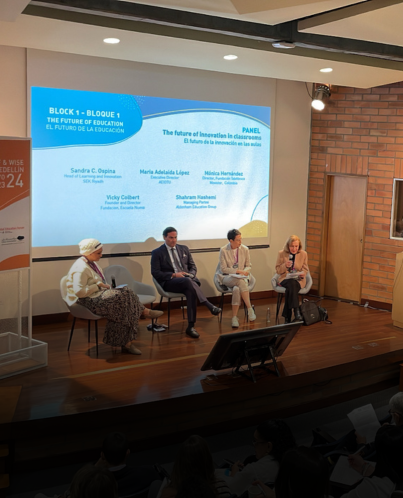Month: June 2023
Why The Future of Education is Personalised
Personalised education could revolutionise the traditional education system by tailoring learning experiences to students, and new and emerging educational technology (edtech) is already playing a vital role. Aldenham Education Group’s Managing Partner, Shahram Hashemi, has years of experience in the education sector, and last month he was invited by the globally-renowned non-profit Qatar Foundation to speak at the Global Education Forum & WISE @ Medellin Conference to shed some light on the future of education. The benefits of personalised learning include increased accessibility and a boost in engagement, but there are still challenges such as data privacy and an increased workload for teachers. By harnessing the power of edtech, we’re paving the way for a more effective and student-centred educational experience.
The impact of edtech
Education has changed drastically over the past few years, and thanks to technological innovations, it’s evolving fast. AI in particular has come on in leaps and bounds, and has transformed the education sector. Despite school districts around the world banning AI tools like ChatGPT, AI has tremendous potential and could help personalise education. Some countries, like the UAE, have already begun working on guidelines and policies to help AI tools elevate the education system. AI algorithms analyse students’ data – everything from their grades and exam results to their learning styles and preferences. This data can be used to help students – algorithms can recognise pupils’ strengths and weaknesses, and teachers can then use this information to create personalised curriculums, or lesson plans tailored to each pupil.
VR can offer students a more interactive learning experience, and improve student engagement. It can be used in subjects like science, history, and geography, taking students back in time or to different parts of the world without leaving the classroom, giving them unique perspectives that they wouldn’t have otherwise have had. Pilots and medical professionals have been using VR technology to train for years, but it’s only recently that the technology has entered the classroom. VR technology can even incorporate multi-sensory elements to give students visual, auditory, and even tactile feedback. Not every student learns the same way – while some would learn more from books, others benefit from being fully immersed in a virtual world.
Benefits of personalised learning
By breaking down barriers and providing students with equal opportunities, personalised learning makes education more accessible. Teachers can tailor their lessons to students’ individual needs and preferences, meaning students learn at their own pace. Personalised learning also allows for targeted support and intervention, ensuring students receive the assistance they need. This approach will help to bridge the educational inequality gap, which only worsened during the COVID-19 pandemic. According to a UNICEF report from last year, 147 million children had missed more than half of their in-person schooling because of the pandemic – amounting to 2 trillion hours lost. A more personalised approach to education would give underserved communities and students with special needs a more rounded experience.
The traditional “one-size-fits-all” approach to education can fail to meet students’ diverse needs. Taking a more customised learning experience empowers students – they don’t have to hurry through subjects they find challenging, or waste time on topics they already understand. By giving students content specifically tailored towards them, teachers enhance students’ comprehension and knowledge retention skills. Individualised feedback also gives students more guidance, helping them track their progress and address areas that need improvement. This way, teachers foster higher levels of student engagement, helping students to feel more connected to their education journey.
Challenges and considerations
While personalised learning holds immense promise, it also presents a number of challenges – particularly for teachers. Creating personalised curriculums, lesson plans, and assessments for each one of their students can be time-consuming and demanding. A YouGov survey revealed that 87% of teachers already had issues related to workload pressures. In order to fully harness the benefits of personalised learning, educators require adequate training and support. Investing in professional development programs, and providing educators with the necessary resources and tools, are essential steps for governments and private education companies, if they want to ensure the success of their personalised learning approaches.
Since personalised learning relies heavily on the collection and analysis of student data, there are concerns and ethical considerations over data privacy. Safeguarding student data is of utmost importance to protect their privacy and maintain trust, particularly with cyber crime on the rise. Last year in the UK, 41% of primary schools surveyed reported they’d suffered a data breach or a cyber attack. It’s important for educational institutions to establish strict data privacy policies to protect students, and to ensure responsible use of edtech tools like AI and VR.
Aldenham’s approach to education
At Aldenham Education Group’s schools, including Aldenham School in the UK and Aldenham Prep Riyadh in Saudi Arabia, we’ve embraced a personalised learning approach. We’ve recognised that learning needs to be enjoyable, engaging, and (more importantly) fun, especially for younger children. Our approach to learning ensures that all pupils learn at their own pace, and according to their own styles. We’ve also embraced modern technology wherever we can, especially in the classroom. Tools such as interactive screens, computers, and state-of-the-art VR systems ensure we offer our pupils a learning experience that’s adaptable and flexible.
Personalised learning makes learning more immersive for students, increasing their engagement and improving their academic performance. As Shahram Hashemi explained while on stage at the Global Education Forum & WISE @ Medellin Conference, “With this technology, we can make sure that each child gets the needs that they require. We can customise the education and support the kids that are behind.” He also shared that AEG has begun working closely with top-tier consulting firms, to develop a strategy on how we can get more of these edtech technologies into our schools, and make our learning more effective.
Personalised learning holds immense potential, and is already beginning to reshape the future of education. By leveraging the power of edtech, we can create inclusive, student-centred learning environments that cater to the diverse needs of today’s pupils. Educators, policymakers, and edtech developers must work together to ensure education is as inclusive and effective as possible. By investing in a personalised learning approach, schools invest in the future of students, empowering them to thrive in an ever-changing world. To find out more about how AEG prepares pupils for life after graduation, visit Aldenham’s website.
The Pandemic Bump’s Over – What’s Next For Edtech?
In recent years, the world witnessed a significant surge in the adoption of educational technology – more popularly known as edtech. The COVID-19 pandemic forced schools and educational institutions to quickly adapt to the new normal of remote learning, leading to an unprecedented demand for digital tools and platforms. This boom (often referred to as the ‘pandemic bump’) revolutionised the education sector. Aldenham Education Group’s Managing Partner, Shahram Hashemi, has years of experience in both the education and investment sectors – last month, the globally-renowned non-profit Qatar Foundation invited him to the Global Education Forum & WISE @ Medellin Conference to shed some light on the future of education. Will edtech continue to grow and innovate, or was it a necessity during the pandemic? And as the world returns to normality, it raises the question – what’s next for edtech? Shahram Hashemi took to the stage at the international event to share his expertise and insights, and explain how today’s academic institutions are shaping the future of education.
The growth of edtech
GEF & Wise brought together education leaders and experts from across the globe, and all of them agreed that the pandemic had a drastic effect on schools – as they were forced to close, there was a rapid shift to remote learning. This caused problems at first, as many schools had never offered their students any kind of remote learning before 2020. Schools and teachers had to alter the way they taught students, and they turned to new rising technologies like AI or VR. These and other edtech innovations make learning more effective, both in and out of the classroom. The increased demand for this technology drove innovation, which in turn drove investment. In 2021, the global edtech industry saw almost $21 billion (£16.7 billion) of funding from venture capitalists – far more than in 2019, which saw just $7 billion (£5.5 billion) go towards edtech businesses.
Hybrid learning
The pandemic might be over, but many believe it’s reshaped the education sector forever. As schools have reopened and students have returned to classrooms, there’s been a shift towards hybrid learning models, which combine in-person teaching with digital tools. The pandemic highlighted the benefits of online learning, such as flexibility and accessibility, and these advantages are here to stay. Edtech is set to play a crucial role in supporting the transition to hybrid learning – with many schools seamlessly integrating technology into their classrooms. Here at Aldenham’s schools, we always look to the future and seek out new ways of utilising new technology in our schools. At Aldenham Prep Riyadh, all of our classrooms have interactive screens to enhance students’ learning experience, while the school’s Learning Resource Center features computers and a VR system, so students can engage with new subjects in immersive ways.
Personalised learning
One of the biggest benefits of edtech lies in its ability to personalise education, and allow teachers to cater to individual students’ needs. With AI-powered adaptive learning technologies, teachers can analyse student data and create individual curriculums designed around each student’s strengths and weaknesses. This more tailored approach helps students to learn at their own pace, and be better equipped to overcome challenges. There’s been a lot of advancements in AI in recent years, and although schools have banned AI chatbots like ChatGPT, this technology is set to transform the education sector. If the edtech industry continues to grow, we can expect to see more advancements around AI and personalised learning.
Edtech today
Although edtech grew exponentially throughout the pandemic, that growth appears to have stunted post-pandemic. In fact, 2023 has been dubbed ‘edtech’s year of reckoning.’ A recent report by HolonIQ found that last year, there was $10.6 billion (£8.4 billion) of investment in edtech – around 49% of the investment in 2021. With schools around the world no longer forced to use edtech solutions to teach their students, many stopped using edtech altogether, and many edtech companies have scaled back. Despite this fall in investment, there’s still demand for edtech, and with new advances in technology all the time, new companies are springing up and offering innovative solutions. Edtech is increasingly important, as it teaches students valuable skills, and gets them more engaged in their education, setting them up for later life. At Aldenham, we aim to support our children as much as possible, and pride ourselves on investing in the latest edtech and cutting-edge facilities wherever possible.
The future of edtech
A paper in Nature Human Behaviour found that students lost out on about 35% of a normal school year’s worth of learning over the course of the pandemic. Governments and organisations around the world need to work to make learning more accessible for students, and edtech is the most effective way of achieving this. While the pandemic accelerated the adoption of edtech, it also exposed the digital divide that exists among students worldwide.
UNESCO reported that at least 463 million – or nearly one-third – of students around the world don’t have the right devices or reliable connections, and can’t access remote learning facilities. As the edtech sector continues to grow, work needs to be done to address this issue and bridge this digital divide. Governments and educational institutions alike need to be investing in edtech companies to ensure no student is left behind. AEG has expert first-hand knowledge of the education market, and we can offer guidance for edtech businesses. One way of supporting edtech firms is by trialling new technologies in schools – not only do schools and students benefit from using these solutions, but edtech firms also get much-needed feedback to be as effective as possible.
The pandemic brought edtech into the spotlight, showcasing its potential to transform education. With the pandemic now over, the future of edtech lies in hybrid learning, personalised learning, and making education more accessible for all. While there are challenges, edtech offers a brighter future for education. We need to be working towards creating a more inclusive learning environment for all students, just as we strive to do here at Aldenham. To find out more about what edtech trends you should be looking out for, have a read of one of our recent blogs.
AI’s Impact on Education
Technology plays an integral role in shaping the education sector, and is rapidly evolving. Despite being a relatively new innovation, artificial intelligence (AI) is already beginning to transform how today’s students are learning – and will be crucial in preparing them for their lives after graduating. Last month, the Qatar Foundation asked Aldenham Education Group’s Managing Partner, Shahram Hashemi, to speak at the prestigious GEF & WISE @ Medellin Conference and share his years of expertise on these topics – and more. Despite the potential risks of AI, it will have a revolutionary impact on students and teachers alike – and it’s important that governments and educational institutions consider how to regulate this technology while it’s in its infancy, as Shahram Hashemi shared to an audience of rapt education thought leaders.
The benefits of AI in education
While some schools may hesitate to adopt AI tools like ChatGPT – some are going as far as banning it – AI isn’t a threat to education. Rather a valuable tool, and you can learn more in our recent blog on the topic. For example, AI in education can analyse vast amounts of data and turn this into meaningful insights. Not only can this be used by schools and educators to identify trends and areas for improvement (all backed by evidence), but it can be used by teachers in classrooms. Teachers can use these insights to personalise their students’ educational experiences, creating curriculums that are tailored towards each child’s needs, interests, and even learning styles.
As Shahram Hashemi explained while at GEF & WISE, “With this technology, we can make sure that each child gets the needs that they require.” Using AI-powered algorithms, teachers can identify knowledge gaps and give each student specific feedback designed to improve their engagement and achievement. AI tools can even automate the marking of tests and assignments, freeing up teachers to focus on more important tasks. Students, meanwhile, could benefit from AI-powered virtual tutors that offer them real-time guidance and support and can even adapt to each student’s pace, furthering their education outside of the classroom.
The challenges of AI
Although the benefits posed by AI in education are immense, there are some potential risks that must be considered. Since AI relies on vast amounts of data, there are concerns about the privacy and security of people’s data. When it comes to education, it’s important that schools, universities, and other institutions ensure there are robust data protection frameworks in place, in order to safeguard their students’ sensitive information.
While integrating AI into education, we should also take care to consider equality, and ensure that underprivileged schools and communities around the world can access the same AI tools and resources as everyone else. This is crucial to avoid worsening any pre-existing educational inequalities, and was one of the topics discussed by Shahram Hashemi in Medellin earlier this year. Organisations need to be carefully monitoring the use of AI, and ensuring that AI tools remain fair and balanced within education – especially when it comes to student assessment or, later in life, university admissions.
Should AI be regulated?
In order to harness the full potential of AI in education – while still safeguarding students’ best interests, governments and education institutions alike need to adopt more forward-thinking regulations. Some considerations to bear in mind include: establishing ethical guidelines, so that schools can address issues like student privacy, and transparency of AI algorithms; and regularly monitoring AI systems to identify and address potential biases. Organisations should also collaborate to share standards and insights – in the past, AEG has worked closely with the Saudi government, and we hope to continue to share our expertise on this topic.
At AEG’s schools – including Aldenham Prep Riyadh and our schools in the UK – we’ve always embraced technology and innovation wherever possible. As Shahram Hashemi pointed out on stage at GEF & WISE, “We always look at ourselves as trying to innovate in technology, and innovate in the classroom.” Our commitment to providing a cutting-edge learning environment for all of our students across the globe is evident through our use of interactive screens, 3D printers, and other state-of-the-art tools. Moving forward, we are excited about integrating AI technology in our schools to further enhance students’ learning experiences. With the help of AI in education, we can personalise teaching, give teachers valuable insights, and equip students with essential skills for the future.
As AI continues to advance at a remarkable pace, its impact on education is undeniable, but we understand the importance of striking a balance between technology and human interaction – ensuring that AI enhances, rather than replaces, the role of educators. At AEG, we are committed to staying at the forefront of educational innovation and harnessing the power of AI. By using AI in education responsibly, we can ensure that our students are well-equipped to navigate the challenges and opportunities presented by the jobs of tomorrow. Find out more about the facilities – including cutting-edge technology – on offer at Aldenham Prep Riyadh.



